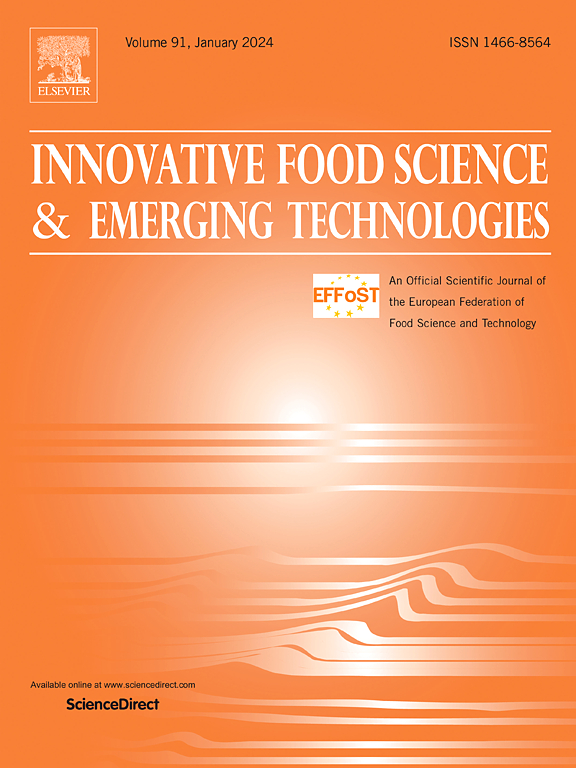Biscuits for the gut: A symphony of FODMAPs and dietary fibre in gut microbiome for irritable bowel syndrome (IBS) management
IF 6.3
1区 农林科学
Q1 FOOD SCIENCE & TECHNOLOGY
Innovative Food Science & Emerging Technologies
Pub Date : 2024-10-01
DOI:10.1016/j.ifset.2024.103832
引用次数: 0
Abstract
Emerging evidence suggests gut microbiome alterations significantly influence irritable bowel syndrome (IBS) symptoms with fermentable oligosaccharides, disaccharides, monosaccharides, and polyols (FODMAPs) implicated in triggering symptoms.
This study investigated the impact of low and high FODMAP biscuit models on gut microbiota including: Biscuit Flour Control (BiFC), Low-FODMAP Control (LFC), Low-FODMAP High-Fibre Prototype (LFP), and Wholemeal Flour Control (WMC). Biscuits were subjected to in vitro digestion which was followed by in vitro colonic fermentation. 16S rRNA gene sequencing and fatty acid analyses were performed at the end of fermentation.
Alpha diversity analysis revealed samples fermented with LFP induced higher diversity compared to samples fermented with BiFC and LFC. The relative abundance of Escherichia-Shigella was significantly lower in LFP fermentates than BiFC fermentates. LEfSe analysis showed LFC fermentates were characterized by higher levels of Citrobacter and Ligilactobacillus. Significantly reduced acetate and butyrate levels were found in LFP fermentates compared to LFC fermentates. WMC fermentates had higher acetate and propionate levels compared to other biscuit fermentates.
In conclusion, incorporating low-FODMAP, high-fibre food prototypes may enhance gut microbial diversity and reduce potentially pathogenic bacteria such as Escherichia-Shigella. These findings highlight the potential of personalized dietary interventions, such as the manipulation of biscuit formulations, in modulating gut microbiota and managing IBS symptoms.
Industrial relevance
The low FODMAP diet has been developed as an effective method to moderate the symptoms of IBS patients by reducing bloating and gas in the colon. Our results revealed that the low-FODMAP, high-fibre biscuit model proved more effective than the low-FODMAP biscuit for generating a gut microbiota that could contribute to easing IBS symptoms. Future research should focus on improving this formulation and adapting it to treat the different forms of IBS. This study also demonstrates the efficacy of using colon fermentation models to devise food formulations for gut microbiome-associated diseases.
肠道饼干:肠道微生物群中的 FODMAPs 和膳食纤维交响曲,用于肠易激综合征 (IBS) 的调理
新的证据表明,肠道微生物群的改变对肠易激综合征(IBS)症状有重大影响,其中可发酵低聚糖、双糖、单糖和多元醇(FODMAPs)与引发症状有关:该研究调查了低 FODMAP 和高 FODMAP 饼干模型对肠道微生物群的影响,包括:饼干面粉对照组 (BiFC)、低 FODMAP 对照组 (LFC)、低 FODMAP 高纤维原型 (LFP) 和全麦面粉对照组 (WMC)。对饼干进行体外消化,然后进行体外结肠发酵。发酵结束后进行了 16S rRNA 基因测序和脂肪酸分析。α多样性分析表明,与使用生物全脂面粉和全脂面粉发酵的样品相比,使用全脂面粉发酵的样品具有更高的多样性。LFP发酵产物中的埃希氏菌相对丰度明显低于BiFC发酵产物。LEFSe分析表明,LFC发酵物的特点是柠檬酸杆菌和半乳杆菌含量较高。与 LFC 发酵物相比,LFP 发酵物中的乙酸盐和丁酸盐含量明显降低。总之,加入低-FODMAP、高纤维食品原型可提高肠道微生物多样性,减少潜在致病菌,如志贺氏菌。这些发现凸显了个性化膳食干预(如饼干配方)在调节肠道微生物群和控制肠易激综合征症状方面的潜力。 工业相关性低 FODMAP 膳食已被开发为一种有效方法,可通过减少结肠胀气和气体来缓解肠易激综合征患者的症状。我们的研究结果表明,与低 FODMAP 饼干相比,低 FODMAP 高纤维饼干能更有效地生成有助于缓解肠易激综合征症状的肠道微生物群。未来的研究应侧重于改进这种配方,使其适用于治疗不同形式的肠易激综合征。这项研究还证明了利用结肠发酵模型设计食品配方治疗肠道微生物相关疾病的有效性。
本文章由计算机程序翻译,如有差异,请以英文原文为准。
求助全文
约1分钟内获得全文
求助全文
来源期刊
CiteScore
12.00
自引率
6.10%
发文量
259
审稿时长
25 days
期刊介绍:
Innovative Food Science and Emerging Technologies (IFSET) aims to provide the highest quality original contributions and few, mainly upon invitation, reviews on and highly innovative developments in food science and emerging food process technologies. The significance of the results either for the science community or for industrial R&D groups must be specified. Papers submitted must be of highest scientific quality and only those advancing current scientific knowledge and understanding or with technical relevance will be considered.

 求助内容:
求助内容: 应助结果提醒方式:
应助结果提醒方式:


